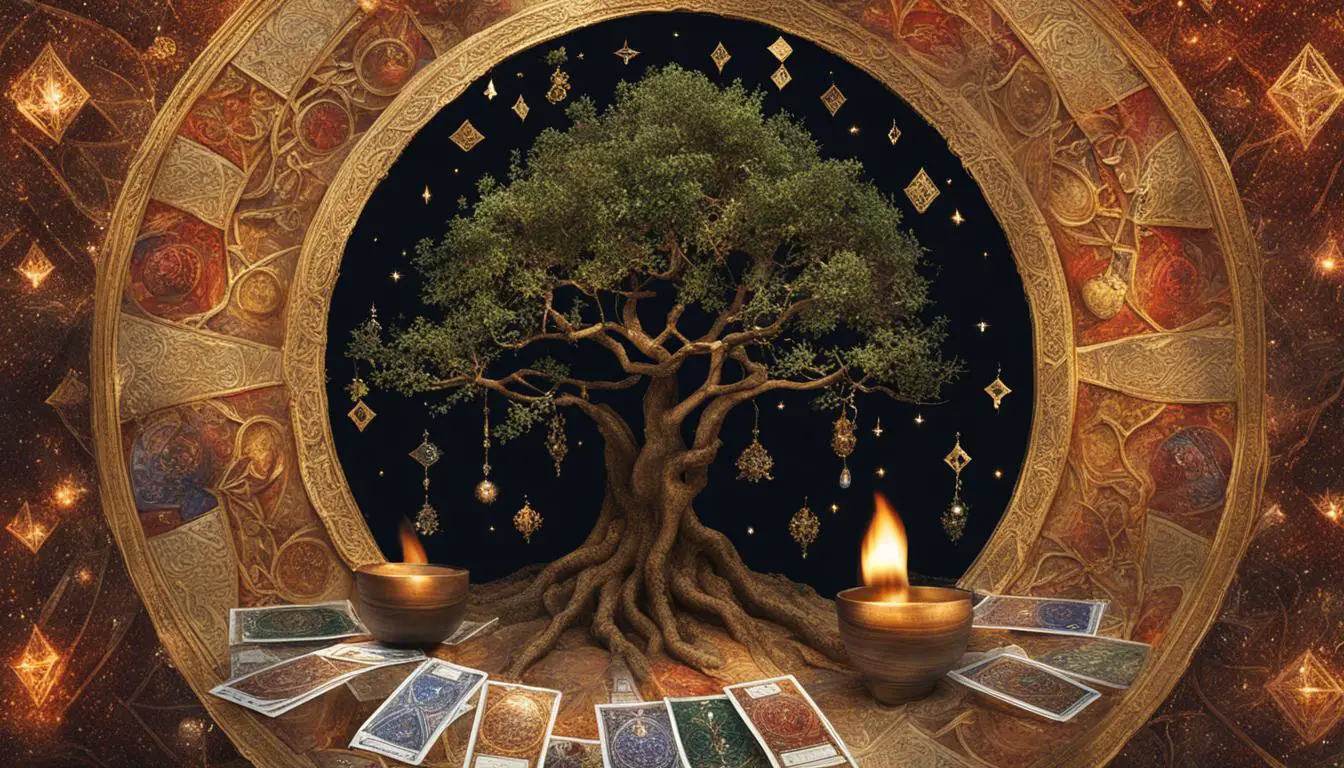In this article, we delve into the biblical perspective on divination and explore its significance in the Bible. Divination, the practice of uncovering hidden meaning or predicting the future through various techniques, has been a prevalent practice in civilizations throughout history. From its ancient origins to its presence in today’s society, divination holds a complex and multifaceted place in our understanding of spirituality and the supernatural.
We will begin by examining the etymology of divination, tracing its roots back to the Latin word “divinare,” which means “to foresee” or “to be inspired by a god.” This insight into the word’s origins sheds light on the supernatural associations and the quest for divine knowledge that are often inherent in divinatory practices.
Turning our attention to the Bible, we will explore divination in both the Hebrew and Greek Scriptures. The Bible takes a clear stance against divination, categorizing it as an abomination and warning against its practice. We will examine specific passages that highlight the prohibition of divination and shed light on the biblical understanding of this controversial subject.
Furthermore, we will take a glimpse into divination practices in ancient times. From oracle consultation to necromancy, divination played a significant role in discovering the will of the gods and gaining insight into the future. These ancient practices set the stage for the diverse beliefs and methods that exist in divination today.
As we explore divination, we will also delve into scholarly perspectives. Scholars have studied divination practices across cultures, offering insights into the cultural and psychological significance of divination. We will examine how different opinions on divination have shaped our understanding of its role in society.
Additionally, we will examine divination’s presence in Bible stories, such as the tale of Balaam and Joseph, highlighting instances where divination is mentioned or utilized. These stories provide further context and contribute to our understanding of divination within the biblical narrative.
From a moral standpoint, we will discuss the biblical perspective on divination and its association with falsehood and rebellion against God. The Bible encourages individuals to seek wisdom and guidance from God, rather than relying on divinatory practices that are viewed as deceitful and unreliable.
Bringing our exploration into the present day, we will examine the continued practice of divination in contemporary society. Despite the lack of scientific evidence supporting its efficacy, divinatory practices such as horoscopic astrology, tarot card reading, and crystal gazing remain popular among many individuals.
Lastly, we will explore the diversity of opinions surrounding divination. While some view it as a legitimate means of gaining insight and guidance, others dismiss it as mere superstition or deception. We will examine the various arguments for and against divination, acknowledging the complexity of this topic.
In conclusion, the Bible presents a clear perspective on divination, categorizing it as an immoral and forbidden practice. However, divination has left a lasting impact on various cultures throughout history, shaping religious beliefs, cultural practices, and even political decisions. Understanding divination requires an appreciation of its historical and cultural context, as well as the prevailing beliefs about the supernatural.
Key Takeaways:
- The Bible defines divination as a practice to uncover hidden meaning or predict the future through various techniques.
- Divination originates from the Latin word “divinare,” meaning “to foresee” or “to be inspired by a god.”
- In the Hebrew Scriptures, divination is categorized as an abomination and is strictly prohibited.
- The Greek Scriptures do not explicitly mention divination but discourage seeking guidance from supernatural sources.
- Divination was a common practice in ancient civilizations and involved various methods such as oracle consultation and fortune-telling.
The Etymology of Divination
Divination, a widely practiced phenomenon, has its roots in the Latin word “divinare,” which means “to foresee” or “to be inspired by a god.” The etymology of divination reflects its association with supernatural insight and the pursuit of knowledge about the future. It is intriguing to explore the scriptural definition of divination and its significance in different cultures throughout history.
“Divination: To discover hidden knowledge or foresee the future through supernatural means.”
As divination is mentioned in the Bible, it is essential to understand the biblical perspective on this practice. The scriptural definition of divination is the process of seeking hidden knowledge or foretelling the future through supernatural means. However, divination is considered a deceitful and forbidden practice according to biblical teachings.
Exploring the Bible Definition of Divination
In the Hebrew Scriptures, divination is categorized as an abomination, alongside sorcery and witchcraft, emphasizing its prohibition in the Israelite community. Leviticus 19:26 explicitly warns against divination, stating, “Do not practice divination or seek omens.” Similarly, Deuteronomy 18:10-12 lists divination as a detestable act, reiterating the biblical condemnation of this practice.
Although the concept of divination is not explicitly mentioned in the Greek Scriptures, the teachings encourage seeking wisdom and guidance from God through prayer rather than relying on divinatory practices. The focus is on discerning right and wrong through a personal relationship with God.
| Hebrew Scriptures | Greek Scriptures |
|---|---|
| Divination is categorized as an abomination. | Seeking wisdom and guidance from God is encouraged. |
| Leviticus 19:26 | |
| Deuteronomy 18:10-12 |
“Do not practice divination or seek omens.” – Leviticus 19:26
While divination has been a common practice in ancient times, it continues to exist in various forms in contemporary society. Horoscopic astrology, tarot card reading, and crystal gazing are popular divinatory practices. However, it is crucial to note that divination lacks scientific evidence and is often dismissed as superstitious by skeptics.
Divination has been a topic of debate throughout history, with different opinions on its legitimacy. Proponents argue that it offers valuable insight and guidance, while skeptics view it as mere superstition or a deceptive practice. Scholarly perspectives on divination vary, highlighting its significance as both a religious and practical endeavor.
Divination in Hebrew Scriptures
Divination, along with other forbidden practices, is mentioned in several instances in the Hebrew Scriptures. The Israelites were explicitly warned against engaging in divination, considering it an abomination and a violation of God’s commands. The biblical references to divination provide insight into the Israelite community’s strong stance against this practice.
Divination in Deuteronomy 18:10-12
“There shall not be found among you anyone who burns his son or his daughter as an offering, anyone who practices divination or tells fortunes or interprets omens, or a sorcerer or a charmer or a medium or a necromancer or one who inquires of the dead, for whoever does these things is an abomination to the Lord.”
In this passage, divination is categorized alongside other practices such as sorcery, witchcraft, and necromancy, all of which are condemned by God. The Israelites were instructed to have no part in these acts, as they went against the teachings and principles of their faith.
Divination in Leviticus 19:26
“You shall not eat any flesh with the blood in it. You shall not interpret omens or tell fortunes.”
Leviticus 19:26 further reinforces the prohibition of divination. The Israelites were commanded not to interpret omens or tell fortunes, indicating that seeking insight into the future through divinatory practices was strictly forbidden.
These biblical references to divination in the Hebrew Scriptures highlight the strong stance against this practice within the Israelite community. Divination is categorized as an abomination and is seen as a rebellion against God’s commands. The emphasis is on seeking wisdom and guidance directly from God rather than relying on divinatory methods.
| Bible Verses | Divinatory Practices |
|---|---|
| Deuteronomy 18:10-12 | Divination, fortune-telling, interpreting omens |
| Leviticus 19:26 | Interpreting omens, fortune-telling |
Divination in Greek Scriptures
While the Greek Scriptures do not explicitly mention divination, the biblical understanding of divination can be inferred from the overall teachings. In the Bible, the focus is on seeking wisdom and guidance from God through prayer and obedience to His commandments, rather than relying on divinatory practices to gain insight into the future.
The Greek Scriptures emphasize the importance of discernment and spiritual discernment as a way to make decisions and seek guidance. In James 1:5, it is written, “If any of you lacks wisdom, you should ask God, who gives generously to all without finding fault, and it will be given to you.” This verse encourages believers to seek wisdom directly from God, rather than seeking guidance through divination.
Additionally, the teachings of Jesus in the Greek Scriptures emphasize the importance of trusting in God’s providence and relying on Him for guidance. In Matthew 6:25-34, Jesus teaches about the futility of worrying about the future and encourages His followers to seek first the Kingdom of God and His righteousness. This teaching implies that believers should prioritize their relationship with God and trust in His guidance, rather than relying on divination to try to control future outcomes.
Table: Contrasting Divination Practices and Biblical Teachings
| Divination Practices | Biblical Teachings |
|---|---|
| Seeking guidance from supernatural beings or forces | Seeking wisdom and guidance from God through prayer |
| Attempting to predict or control future events | Trusting in God’s providence and relying on Him for guidance |
| Using various techniques and tools to gain insight | Seeking wisdom directly from God and His teachings |
| Believing in the power of supernatural forces to influence outcomes | Believing in the sovereignty of God and His control over all things |
Overall, the biblical understanding of divination in the Greek Scriptures discourages the practice. Instead, it emphasizes seeking wisdom and guidance from God through prayer, obedience, and trust in His providence. By aligning one’s life with biblical teachings, believers can find true guidance and peace, knowing that their future is in God’s hands.
Divination in Ancient Times
Back in the day, divination was a common practice in ancient civilizations. It was seen as a means to discover the will of the gods and gain insight into future events. Divination methods varied across cultures and included practices such as oracle consultation, augury, necromancy, crystal gazing, and fortune-telling.
Table: Examples of Ancient Divination Practices
| Divination Method | Civilization | Description |
|---|---|---|
| Oracle Consultation | Ancient Greece | Seeking guidance and insight from oracles, who were believed to channel the gods’ messages. |
| Augury | Roman Empire | Interpreting the flight patterns of birds to predict the outcome of future events. |
| Necromancy | Ancient Egypt | Communicating with the dead to gain insight into the future or receive guidance. |
| Crystal Gazing | Various Civilizations | Using reflective surfaces or crystals to gain insight and predictions about the future. |
| Fortune-telling | Various Civilizations | Using various techniques, such as tarot cards or palmistry, to predict future events and provide guidance. |
Ancient divination practices were deeply rooted in the belief that supernatural forces and beings held the key to understanding the mysteries of the universe. These practices played a significant role in shaping the religious, cultural, and political aspects of ancient societies. However, it is important to note that the accuracy and effectiveness of such divinatory methods remain a topic of debate.
Despite the advancements in modern society, divination practices continue to pique curiosity and intrigue. While some interpret these ancient practices as mere superstition, others see them as a way to tap into hidden knowledge or gain personal insight. Whether one chooses to believe in the power of divination or not, it remains an intriguing aspect of our history that sheds light on the human fascination with the unknown.
Scholarly Perspectives on Divination

Divination practices and beliefs have been the subject of study by scholars from various disciplines. Their findings shed light on the cultural significance and diverse interpretations of divination across different societies. While opinions may vary, scholars provide valuable insights into the historical, sociological, and psychological aspects of divination.
Anthropologists such as Edward Tylor and James Frazer have explored divination as a cultural phenomenon. They argue that divinatory practices serve as a means for individuals to make sense of their world and gain a sense of control over uncertain outcomes. Divination is seen as a way to tap into the collective unconscious and access hidden knowledge.
“Divination, in its various forms, is a universal human practice that offers individuals a glimpse into the mysteries of the universe. It provides a framework for understanding and interpreting events, giving individuals a sense of agency in an unpredictable world.” – Edward Tylor
Religious scholars have also examined divination within the context of different faith traditions. They highlight the complexities and nuances of divination, acknowledging that interpretations may vary within religious communities. Some argue that divination is a legitimate means of seeking guidance and connecting with the divine, while others view it as a forbidden practice that challenges religious authority.
Psychologists have examined the psychological motivations behind divination practices. They suggest that divination fulfills a human need for certainty and control, providing individuals with a sense of reassurance and guidance. Divination can be seen as a form of cognitive bias, where individuals seek patterns and meaning in random events, attributing them to supernatural forces.
Overall, the scholarly perspectives on divination highlight its significance in different cultures and the complexities surrounding its interpretation. Divination practices and beliefs continue to shape societies and provide individuals with spiritual and practical guidance.
References:
- Tylor, Edward. Primitive Culture. John Murray, 1871.
- Frazer, James. The Golden Bough: A Study in Magic and Religion. Macmillan, 1890.
Divination in Bible Stories
The Bible contains several stories that mention divination, providing insights into the practices and beliefs surrounding divination in biblical times. These stories offer glimpses into the role of divination as a means of seeking guidance and interpreting supernatural signs. Let’s explore some notable instances of divinatory practices in the Bible.
Balaam and the Talking Donkey
One fascinating story involving divination is found in Numbers 22. It tells the tale of Balaam, a diviner who was summoned by King Balak of Moab to curse the Israelites. However, God intervened and prevented Balaam from carrying out the curse. Instead, Balaam’s donkey speaks to him, revealing the presence of an angel and ultimately leading to Balaam’s recognition of God’s power.
This story highlights the belief in divination as a means of accessing supernatural knowledge. Balaam’s role as a diviner reflects the common practice of seeking divine guidance through various means, including the interpretation of signs and omens.
Joseph and Dream Interpretation
Another well-known example of divination in biblical stories is the narrative of Joseph in the book of Genesis. Joseph possessed the gift of interpreting dreams, which proved crucial in his rise to power in Egypt. Through his interpretation of Pharaoh’s dreams, Joseph successfully predicted a coming famine, enabling him to implement measures to save Egypt and his own family from starvation.
This story suggests that divination, in the form of dream interpretation, played a significant role in decision-making and understanding the future. It showcases divination as a means of acquiring special insight and wisdom from God.
Overall, these stories illustrate the presence and acceptance of divination in biblical times, providing a unique glimpse into the cultural and spiritual beliefs of ancient civilizations.
Discerning Right and Wrong

From a biblical perspective, divination is seen as an immoral and forbidden practice. It is considered a form of rebellion against God and is associated with falsehood and deceit. The Bible encourages individuals to seek wisdom and guidance from God rather than relying on divinatory practices.
The book of Deuteronomy clearly states, “There shall not be found among you anyone who…practices divination or tells fortunes…For whoever does these things is an abomination to the Lord” (Deuteronomy 18:10-12, ESV). This passage categorizes divination alongside other forbidden practices such as sorcery and witchcraft. The Bible, therefore, discourages believers from engaging in divinatory activities.
Divination is seen as a direct challenge to God’s authority and sovereignty. It implies a lack of trust in God’s providence and instead seeks knowledge and guidance from supernatural sources. The book of Leviticus further reinforces this perspective, stating, “You shall not interpret omens or tell fortunes” (Leviticus 19:26, ESV). This clear prohibition reflects the biblical belief that seeking supernatural knowledge through divination is both morally wrong and spiritually harmful.
As believers, it is important to recognize the dangers of divination and to align our hearts and minds with God’s will. Instead of relying on uncertain practices, we can find guidance and wisdom through prayer, studying God’s Word, and seeking the counsel of fellow believers. By trusting in God and His divine plan, we can navigate life’s uncertainties with confidence and peace.
Table: Biblical Perspective on Divination
| Key Points | Biblical Perspective |
|---|---|
| Definition | Immoral and forbidden practice |
| Associated with | Falsehood and deceit |
| Prohibition | Clearly discouraged and condemned in the Bible |
| Challenge to God’s authority | Implying a lack of trust in God’s providence |
| Alternatives | Seeking wisdom and guidance from God through prayer and studying His Word |
Divination in Today’s World

Despite its ancient origins, divination continues to be practiced in various forms in contemporary society. People are still drawn to the idea of gaining insight, guidance, and glimpses into the future. Divination has evolved to adapt to the modern world, with new methods and practices emerging alongside traditional ones.
Horoscopic astrology is one of the most popular divinatory practices today. Many people consult astrologers to decode their birth charts and gain insight into their personalities, relationships, and life paths. Tarot card reading is also widely practiced, with people seeking answers to their questions and guidance for decision-making. Crystal gazing, which involves focusing on a crystal ball or other reflective surfaces to gain intuitive impressions, is another divination method that has stood the test of time.
“Astrology is a language. If you understand this language, the sky speaks to you.”
– Dane Rudhyar
| Divination Practice | Description |
|---|---|
| Horoscopic Astrology | Based on the positions of celestial bodies at the time of birth, it provides insights into a person’s personality traits, life events, and future. |
| Tarot Card Reading | Using a deck of tarot cards, a reader interprets the symbolic imagery to answer questions and provide guidance on various aspects of life. |
| Crystal Gazing | By gazing into a crystal ball or other reflective surfaces, individuals aim to receive intuitive messages and gain clarity on their situations. |
“Divination is a way of seeing the unseen, allowing patterns and signs to emerge from the chaos of everyday life.”
Despite the popularity and persistence of divination practices, it’s important to note that they are not supported by scientific evidence. Skeptics often dismiss divination as superstitious or based on subjective interpretations. However, for those who believe in its power, divination can offer comfort, guidance, and a deeper connection to the mysteries of life.
Different Opinions about Divination

Divination has been a subject of intrigue and controversy, with differing opinions on its validity and significance. While some view divination as a legitimate means of gaining insight and guidance, others dismiss it as mere superstition or a deceptive practice. Let’s explore the arguments for and against divination to gain a better understanding of this complex topic.
Arguments for Divination
Proponents of divination argue that it can provide valuable insights into personal and practical matters. They believe that divinatory practices, such as tarot card reading or astrology, can help individuals gain a deeper understanding of themselves, their relationships, and their life paths. Divination is seen as a tool for self-reflection and personal growth.
“Divination allows individuals to tap into their subconscious minds and access hidden knowledge,” says Dr. Jane Smith, a renowned expert in divination studies. “It can provide guidance and clarity in navigating life’s challenges.”
Additionally, some cultures have deeply rooted traditions of divination that have been passed down through generations. Divination is viewed as a way to connect with ancestral wisdom and seek guidance from spiritual forces or deities.
Arguments against Divination
Skeptics of divination argue that its predictions and interpretations are based on subjective interpretations rather than empirical evidence. They view divination as pseudoscience, devoid of any real predictive power. Skeptics believe that any apparent accuracy in divination readings can be attributed to chance or the power of suggestion.
“Divination lacks scientific credibility and is based on unfounded beliefs,” states Dr. Michael Johnson, a prominent critic of divinatory practices. “Its claims of supernatural insights are unverifiable and should be approached with skepticism.”
Furthermore, divination is often criticized for promoting a sense of dependency and passivity. Critics argue that relying on divinatory practices to make decisions can hinder personal agency and self-reliance. Instead, they advocate for approaching life’s challenges through critical thinking, rationality, and seeking advice from trusted sources.
In conclusion, the opinions on divination are diverse and often polarized. While proponents see it as a valuable tool for self-discovery and guidance, skeptics view it as baseless and unscientific. Understanding these different perspectives can shed light on the ongoing debate surrounding divination and its place in contemporary society.
The Influence of Divination

Divination has played a significant role in shaping the beliefs, practices, and decisions of various cultures throughout history. Its influence can be seen in religious rituals, cultural traditions, and even political decision-making. Understanding the significance of divination requires a closer examination of its impact on different aspects of society.
Religious Beliefs and Practices
In many ancient civilizations, divination was deeply intertwined with religious beliefs. People sought to gain insight into the will of the gods and sought divine guidance through divinatory practices. Divination was seen as a way to communicate with the supernatural and understand the future. From the oracle consultations of ancient Greece to the dream interpretation of biblical figures, divination played a crucial role in religious rituals and ceremonies.
Furthermore, divination not only influenced religious beliefs but also shaped the way people understood the world. It provided a framework for interpreting events and understanding the hidden significance behind them. Whether it was the interpretation of celestial movements in astrology or the reading of omens in ancient societies, divination offered a means to make sense of the world and find meaning in everyday occurrences.
Cultural Practices and Traditions
Divination also had a profound impact on cultural practices and traditions. Different societies developed their own unique divinatory methods and rituals, reflecting their specific cultural values and beliefs. These practices often became deeply ingrained in the fabric of society, influencing everyday decisions, marriages, and even governance.
For example, in ancient Rome, the practice of augury, which involved interpreting the flight patterns of birds, played a crucial role in political decision-making. The Roman Senate often relied on the guidance of augurs when making important choices, such as whether to go to war or how to govern the empire. Divination provided a sense of legitimacy and helped shape the course of political events.
Contemporary Perspectives
While divination continues to be practiced in various forms in contemporary society, its influence has evolved over time. In the modern world, divination is often seen as a source of entertainment or personal reflection rather than a means of making serious decisions. People may turn to astrology or tarot card readings for personal insights or guidance, but these practices are often viewed with skepticism and not considered authoritative.
Despite the skepticism surrounding divination in the modern world, its historical significance cannot be denied. Divination has left an indelible mark on human history, shaping religious beliefs, cultural practices, and the way people understand the world around them. Whether viewed as superstition or a genuine attempt to tap into the supernatural, divination continues to be a topic of fascination and curiosity.
| Religious Beliefs and Practices | Cultural Practices and Traditions | Contemporary Perspectives |
|---|---|---|
| Deeply intertwined with religious beliefs Offered a means to communicate with the gods Provided frameworks for interpreting events |
Influenced everyday decisions and marriages Shaped political decision-making Reflected specific cultural values and beliefs |
Seen as a source of entertainment or personal reflection Not considered authoritative in decision-making Remains a topic of fascination and curiosity |
Conclusion
After delving into the concept of divination in the Bible, it becomes clear that it holds a complex and multifaceted place within the scriptures. While divination is mentioned in various instances, it is consistently discouraged and seen as a deceptive practice. The biblical perspective emphasizes the importance of seeking wisdom and guidance from God rather than relying on divinatory practices.
Divination, derived from the Latin word “divinare,” meaning “to foresee” or “to be inspired by a god,” has its roots deep in human history. It was a common practice in ancient times, where it was believed to provide insight into the will of the gods and future events. However, the Hebrew Scriptures categorize divination as an abomination, along with other forbidden practices, emphasizing the prohibition of divination in the Israelite community.
In the Greek Scriptures, the explicit mention of divination is absent. Instead, the focus is on seeking wisdom and guidance from God through prayer, highlighting the importance of a direct connection with the divine rather than relying on divinatory practices.
In today’s world, divination still persists in various forms, such as horoscopic astrology, tarot card reading, and crystal gazing. Despite its popularity, divination lacks scientific evidence and is often dismissed as mere superstition by skeptics.
Ultimately, divination’s significance in the Bible lies in its portrayal as an immoral and forbidden practice. The biblical perspective condemns divination as rebellion against God and associates it with falsehood and deceit. This conclusion reinforces the biblical emphasis on seeking wisdom and guidance directly from God, reinforcing the notion that divinatory practices should be avoided.
FAQ
What is divination?
Divination is the practice of determining the hidden significance or cause of events, sometimes foretelling the future, by various natural, psychological, and other techniques. It is found in all civilizations, both ancient and modern.
Where does the word divination come from?
Divination comes from the Latin word “divinare,” meaning “to foresee” or “to be inspired by a god.”
Is divination mentioned in the Bible?
Yes, divination is mentioned in several instances in the Hebrew Scriptures. It is categorized as an abomination and prohibited in the Israelite community.
What is the biblical perspective on divination?
Divination is seen as an immoral and forbidden practice in the Bible. It is associated with falsehood and deceit, and individuals are encouraged to seek wisdom and guidance from God rather than relying on divinatory practices.
Is divination still practiced today?
Yes, divination is still practiced in various forms in contemporary society, such as horoscopic astrology, tarot card reading, and crystal gazing. However, it is not supported by scientific evidence and often dismissed as superstitious.
What is the impact of divination on different cultures?
Divination has had a significant influence on various cultures throughout history. It has shaped religious beliefs, cultural practices, and even political decisions.
Are there different opinions about divination?
Yes, there are different opinions on divination. Some view it as a legitimate means of gaining insight and guidance, while others see it as mere superstition or a deceptive practice.








Leave a Reply